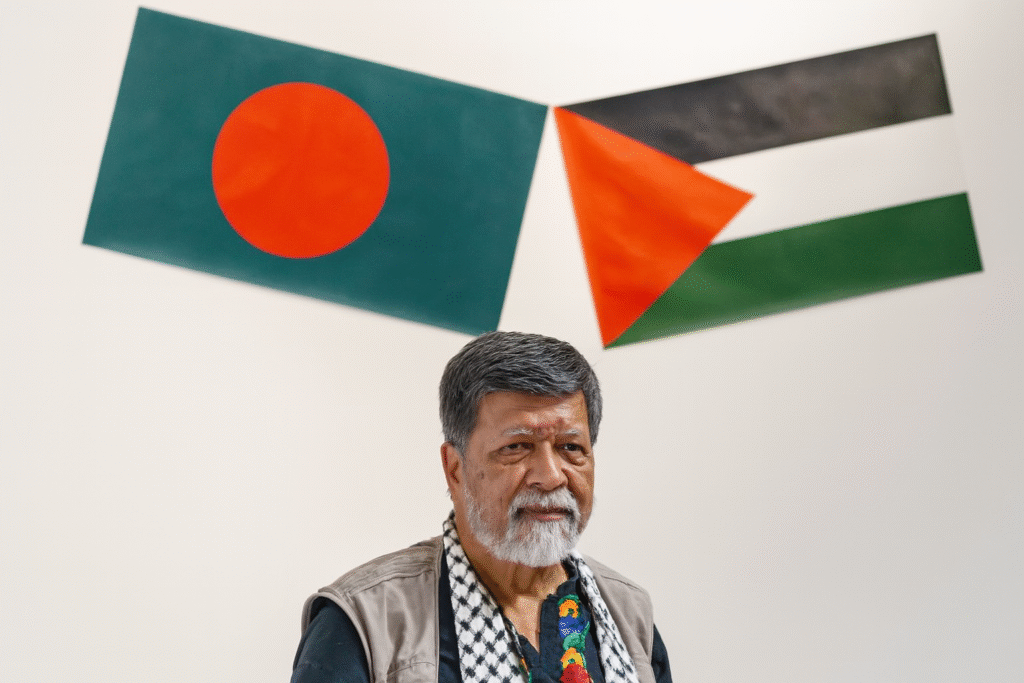“They’ll Try and Stop Us; We’re Prepared”
Shahidul Alam, the celebrated Bangladeshi photographer, activist, and managing director of Drik, has made clear his resolve as he joins the Freedom Flotilla bound for Gaza. Speaking from Otranto, Italy, Shahidul Alam emphasized, “They’ll try and stop us. We’re prepared for that.” His statement reflects the risks, determination, and symbolic weight of his participation in a humanitarian-media mission aimed at breaking Gaza’s isolation.
Around 100 journalists, health workers, and organizers plan to board the main vessel Conscience, which Shahidul Alam described as “an old ship that needs a little bit of work but will certainly get us there.” He acknowledged the dangers, saying the group has trained continuously and is mentally prepared for possible obstruction.
The Flotilla Mission and Preparation
Shahidul Alam’s journey is part of the Global Sumud / Freedom Flotilla mission, which brings together activists, media personnel, legal experts, and health professionals aiming to challenge Gaza’s blockade and spotlight its humanitarian crisis. He stressed that many on the mission are seasoned veterans: “We have lawyers with us. We have an entire crew skilled. Many people who’ve been on flotillas before. Some who’ve been arrested before.”
Boarding was slated for 4 pm local time, and while the outcome was uncertain, the participants expressed their commitment. “We don’t really know what the outcome will be … this is a determined group,” Shahidul Alam said. His voice blends urgency and resolve as he frames the journey as a moral stand: “If we’re defeated, humanity will be defeated.”
Sharing updates on his Facebook handle from on September 30, Shahidul described the situation as one of both determination and danger.
“In a different context this crystal-clear water could have looked very inviting. For us it is a matter of life or death for Gazans and extremely dangerous for us. But this team is determined to break the siege. And we will not give in to the ‘solutions’ western leaders are trying to trap Gazans into,” he wrote while preparing to board the ship.
Shahidul, also noted the risks involved, citing flotilla organiser Huwaida Arrif, who reminded participants that several activists had previously been killed by Israeli forces during similar missions. Arrif herself was in Marwa, where 10 people were killed.
“She explained the dangers involved and provided an opportunity for people to opt out even at the last minute if they considered the trip too risky,” Shahidul wrote.
The Route and Risks
Shahidul Alam provided a fuller account of his path to Otranto and the flotilla in a related report. He left New York on 25 September, after participating in a Ford Foundation session on “Human Rights for Everyone, Everywhere” that included speeches from Muhammad Yunus and the UN High Commissioner for Human Rights. After the event, he attended meetings in Dhaka before flying to Rome and finally reaching Otranto four days later, traveling by bus and train. During this journey, he continued documenting the trip through photos, videos, and captions sent over intermittent Wi-Fi.
At Otranto, he acknowledged the limited accommodations: “Barely managed to get a ghosted tent,” he said, noting the logistical challenges faced even before the voyage begins. He also highlighted the urgency in the humanitarian situation: hospitals in Gaza, particularly Shifa Hospital, have been repeatedly targeted and the remaining medical infrastructure is on the brink.
Shahidul Alam’s meticulous recording of events—captures, captions, travel notes—illustrates his dual mission: not just to be physically present, but to bear witness and amplify voices ignored by mainstream media.
Significance and Symbolism
For Bangladesh, Shahidul Alam’s participation in the flotilla is historic. He is the first Bangladeshi to embark on this mission to Gaza, carrying both symbolic weight and international attention to Bangladesh’s solidarity. His involvement underscores his long history as a human rights advocate and independent media pioneer in Bangladesh, best known for founding Drik, Pathshala, and organizing Chobi Mela.
His resolve—despite known risks, potential obstruction, and geopolitical pressure—resonates with broader themes: the role of independent media in conflict zones, the moral imperative to resist silence, and the ability of individuals from smaller nations to impact global narratives.
Challenges and What Lies Ahead
The mission is fraught with uncertainty. Naval blockades, interdiction attempts, legal challenges, and safety threats all loom large. Shahidul Alam has admitted these risks, saying his team “knows the possibilities and dangers.”Given Israel’s past responses to flotillas and the history of confrontations at sea, stopping or intercepting the vessel is not merely hypothetical.
Another dimension is documentation: once aboard, Shahidul Alam and the media flotilla intend to capture images, interviews, and stories from Gaza—some of which have been suppressed or blocked by access constraints. Through real-time reporting (videos, photos, social media), they may challenge information blackouts and provide direct accounts from Gaza.
Finally, the success or failure of the mission could carry political consequences. Globally, the flotilla may amplify pressure on governments and international institutions regarding the Gaza crisis. For Bangladesh, having a national figure like Shahidul Alam among the media voices could boost its diplomatic and moral visibility.
Shahidul Alam’s words—“They’ll try and stop us; we’re prepared”—capture both defiance and realism. In joining the Gaza flotilla, he is not merely traveling; he is making a statement. His determination to face risks, document truths, and bear witness from Gaza is a continuation of his lifelong commitment to human rights, free expression, and global solidarity.
Whether the voyage succeeds or faces obstruction, Shahidul Alam has already shifted the narrative: Bangladesh now has a presence in one of today’s most contested humanitarian corridors. The world will be watching—not just as spectators, but as listeners to the voices he helps to amplify.
